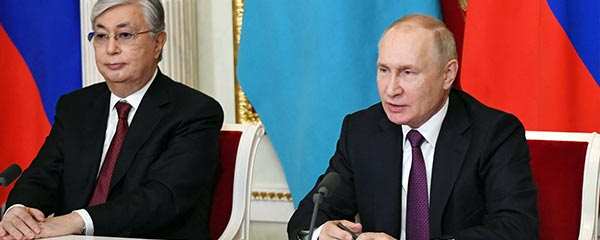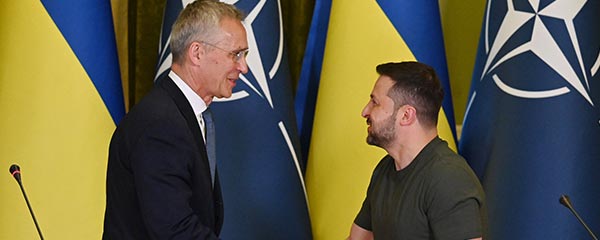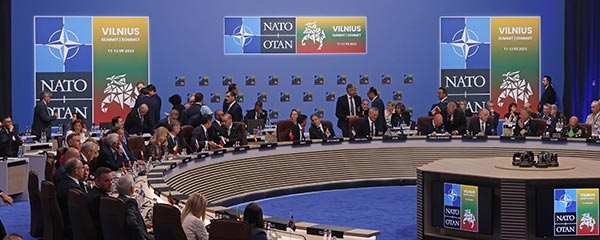Story Highlights
- Majorities in most member states approve of EU, NATO leadership
- Views on domestic institutions, acceptance of migrants predict views on EU, NATO
- U.S., German approval boosts odds of NATO, EU approval by 7.7x and 6.5x, respectively
WASHINGTON, D.C. -- Over the past two decades, the European Union and NATO have weathered many storms, from the Iraq War to the European debt crisis, Brexit and the invasion of Ukraine. Both are also expanding.
A new Gallup analysis suggests the ability of these international institutions to survive -- and thrive -- may be tethered to the actions of powerful member states and the confidence that people in member states have in their domestic political institutions.
In the near term, continued broad approval for these international institutions may hinge on the coming 2024 elections in the United States and 2025 elections in Germany.
When Gallup asked people in their respective member states in 2022 whether they approved of NATO leadership and EU leadership, the responses varied widely, but the overall picture looked positive:
- Majorities in most member states approved of NATO’s leadership (23 out of 31*) and that of the EU (20 out of 27).
- NATO leadership approval was lowest in Türkiye (20%) and Greece (21%) and highest in Norway (88%).
- EU leadership approval was lowest in Greece (26%) and highest in Finland (83%).
- In countries belonging to both organizations, approval levels were similar -- within 15 percentage points of each other -- except for Bulgaria, where approval was 49% for EU leadership and 32% for NATO.
Views of Major Global Powers Are the Biggest Predictor of EU, NATO Approval
By far the strongest predictor of the way people in member states view NATO and the EU is their views of major global powers. This relationship is not wholly unexpected, but the magnitude of the effect is almost outsized.
Controlling for other factors, an individual who approves of U.S. and German leadership -- pillars to these Western institutions -- was 7.7 times more likely to approve of NATO’s leadership and 6.5 times more likely to approve of the EU’s leadership than an individual who approves of neither.
For powers outside the Western bloc, the picture is mixed. Views of China’s leadership are not strongly associated with views of EU and NATO leadership. However, a respondent who disapproves of Russia’s leadership is roughly twice as likely to approve of EU and NATO leadership as an individual who does not disapprove.
Migrant Acceptance, Confidence in Domestic Institutions Also Strong Predictors
Gallup’s Migrant Acceptance Index was born largely out of reaction to the migrant crisis that swept Europe in 2015, with migration into the EU remaining an especially salient and divisive political issue ever since. After years of wrangling, the EU only recently reached an agreement on reforms to deal with the numbers of migrants and refugees coming into the bloc.
The index gauges people's acceptance of migrants based on three questions that ask whether people think migrants living in their country, becoming their neighbors and marrying into their families are good things or bad things.
Controlling for other factors, a respondent who says all three scenarios are a “good thing” is 1.3 times more likely to approve of NATO’s leadership and 1.7 times more likely to approve of the EU’s leadership compared with an otherwise similar respondent who says none of those scenarios is a “good thing.”
The National Institutions Index is based on whether respondents expressed confidence in the military, judicial system, national government, financial system and honesty of elections in their own country.
Accounting for other factors, a respondent who expresses confidence in all five institutions is 3.8 times more likely, on average, to approve of NATO’s leadership and 4.4 times more likely to approve of the EU’s leadership compared with an otherwise similar respondent who lacks confidence in any domestic institution.
These relationships are statistically robust but conceal interesting differences. For instance, the relationship between confidence in domestic institutions and approval of EU or NATO leadership varies significantly across member states.
“Believers” -- those who express confidence in four or all five domestic institutions -- approve of EU and NATO leadership more than “skeptics” -- those who express confidence in two or fewer domestic institutions. The sole exception is Hungary, where approval of EU leadership is slightly higher among those with less confidence in national institutions.
In some countries like Spain and Poland, the gaps in approval toward EU and NATO leadership do not differ dramatically between “believers” in and “skeptics” of domestic institutions. However, this gap between “believers” and “skeptics” is at least 20 percentage points in most countries for NATO leadership (22 out of 31) and EU leadership (20 out of 27).
The gaps are largest in Finland and Slovakia, where approval of EU and NATO leadership is over 50 points higher among “believers” than among “skeptics.” Yet, this similarity obscures a significant difference. “Believers” in domestic institutions (82%) far outnumber “skeptics” (10%) in Finland, whereas “skeptics” (52%) outnumber “believers” (31%) in Slovakia.
Conclusion
The EU and NATO undergird the economic and security ties that bind the Western international political order together. In turn, these international institutions depend on sustained elite and popular support across democratic member states. Approval of the EU and NATO are most strongly associated with attitudes toward domestic institutions and major global powers. These factors are potential sources of cohesion and fragility.
Internal and external efforts to sow mistrust in domestic institutions will likely erode support for these international institutions. Conversely, the ability of democratic political systems to deliver results that secure broad societal confidence in domestic institutions will likely boost support for the EU and NATO. In this case, an institutionalist at home appears more likely to be an institutionalist abroad.
Leadership by the most powerful countries in the EU and NATO -- Germany and the United States, respectively -- also matters. Policies and actions that nurture favorable attitudes toward these great powers will likely strengthen popular support for these international institutions, while policies and actions that elicit unfavorable attitudes will likely weaken popular support for the Western international political order.
* Includes Finland, which joined NATO in 2023
To stay up to date with the latest Gallup News insights and updates, follow us on X.
For complete methodology and specific survey dates, please review Gallup's Country Data Set details.
Learn more about how the Gallup World Poll works.




